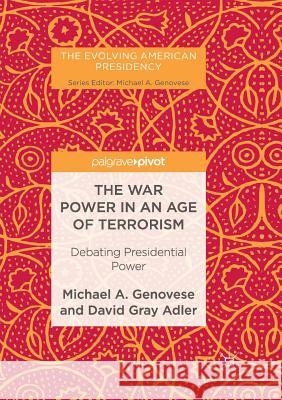The War Power in an Age of Terrorism: Debating Presidential Power » książka
topmenu
The War Power in an Age of Terrorism: Debating Presidential Power
ISBN-13: 9781349958726 / Angielski / Miękka / 2018 / 124 str.
Kategorie BISAC:
Wydawca:
Palgrave MacMillan
Seria wydawnicza:
Język:
Angielski
ISBN-13:
9781349958726
Rok wydania:
2018
Wydanie:
Softcover Repri
Ilość stron:
124
Waga:
0.17 kg
Wymiary:
21.01 x 14.81 x 0.76
Oprawa:
Miękka
Wolumenów:
01
Dodatkowe informacje:
Wydanie ilustrowane











